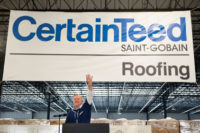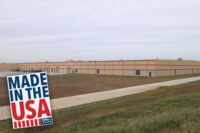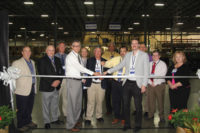Made in the USA: IKO Invests in U.S. Infrastructure and Long-term Growth Strategy

IKO's state-of-the-art shingle production facility in Sylacauga, Ala. All photos courtesy of IKO.

The new facility has ample space for indoor shingle storage and outdoor raw-materials storage.


The shingle-production process in progress at the Sylacauga plant.






IKO believes the roofing market in the United States has a lot of untapped potential. The company’s commitment to becoming a national manufacturer of asphalt roofing shingles has led to a significant investment in its U.S. operations — one that will benefit IKO’s customers in both the short and long term.
Keith Lowe, vice president of U.S. sales for IKO, knows how competitive the U.S. market is. That’s why he appreciates all of the effort the company is putting into having a greater presence, for IKO’s benefit as well as for the benefit of customers who get to see the company’s value. “Our sales people do an excellent job of selling the value of our products and our brand,” he said, “but it’s the investment in our people, processes and facilities that help us deliver that value to our distributors, the contractor and the homeowner.”
The U.S. headquarters for IKO is in Wilmington, Del. While the company was originally founded in Canada, and its global headquarters is in Toronto, IKO has long had a presence in the United States. Its first U.S.-based shingle plant began operation in 1979, not far from the location that eventually became home to its U.S. headquarters. Since that first plant began operation, the company’s presence has grown significantly.
Three new 4-wide shingle production facilities to service the United States have been added in the past eight years — a time in which many manufacturers have scaled back or downsized production. The newest of the three facilities is in Sylacauga, Ala. It’s a state-of-the art shingle production facility Lowe calls the most modern of its kind anywhere in North America. The U.S. southeast will be the recipient of products produced there. In February, ground was broken in Hillsboro, Texas, for another new facility to serve the southwestern market. When completed, it will mark a nationwide manufacturing footprint in the United States for IKO — the first in the company’s history.
“The investment also extends to our joint ventures on the raw materials in Clarksville, Tennessee, and Danville, Illinois, for glass fiber and fiberglass mat, respectively; both of which have been added in the past decade or so,” said Lowe.
Providing Top-notch Customer Service
The development of facilities will help customers in the long term, but assisting customers in the short term is already in effect. Ensuring customers receive product on time and on demand is a priority for IKO. Meeting that goal means evaluating market demands, product and raw material supply needs on an ongoing basis. A vertically integrated supply chain model for sales and operations planning enhances speed and flexibility for meeting customer needs.
“The vertical integration of our operation allows us greater control over the raw material supply and quality coming to our plants,” said Lowe. “Combined with our national manufacturing footprint, that means we are able to meet supplier demands at both local and national levels.” Lowe said product interchangeability is an example of how this integration helps customers. Products manufactured at one plant can be used with products manufactured at another, eliminating the need for all products to come from one manufacturing location and reducing the potential for backorders at peak times of the year.
IKO customers also appreciate the company’s ability to resist fluctuations in the market. “We have instituted a rigorous demand-planning process to ensure that we not only know where the market is now, but where it’s likely to be going in the future,” said Lowe, who added that IKO’s 60-plus years of experience gives it insight into a wide range of different situations, including storms, new housing starts, home equity and consumer confidence levels.
Input regarding current market conditions is gleaned from employees who meet with customers, and that information is added to input from other sources for planning purposes. Meetings are held regularly within IKO to disseminate the data and act accordingly to benefit the client. “It’s a priority for IKO that, regardless of any unpredictable demand patterns, we have the material our customers need in order to provide exceptional customer service that will help our customers win in their marketplace,” said Lowe.
Manufacturers might typically define waste elimination as using as much of the raw materials as possible, as well as reducing energy to produce the material and reusing scraps created during the manufacturing process. IKO takes it one step further. “Wasted time, wasted motion, wasted effort…there are many forms of waste across any business and across any functional area including manufacturing,” said Lowe. “If it does not create value for the customer, we question why we need that activity or process, and we act with urgency to spur continuous improvement to drive out waste from every aspect of the company.”
That’s not to say IKO ignores waste generated during the manufacturing process. The company has managed to reduce manufacturing waste generated by more than 10 percent in each of the past four years. It simply means that all facets of the production process are examined. “We believe in breakthrough changes that require a complete redesign of a process as well as making many small changes and empowering our employees to drive improvement every day,” Lowe said.
Lowe added that IKO has invested heavily in enhanced process control including updated control equipment as well as investing in people with training on statistical process control, the development of robust operator controls plans and a clear understanding of process capability. Quality control on incoming raw materials is examined to reduce potential waste. Added Lowe, “No stone remains unturned.”
Educating, but Always Learning Something New
IKO likes to stay on top of the latest developments in the roofing industry, and the company shares what it knows with contractors. From instructional and educational videos to online tools and in-person seminars, IKO wants contractors to succeed.
“This is why we make the program less about IKO products and more about the business of the contractors’ business,” said Lowe. “We have a talented sales team and distributors who are eager to talk about the many advantages of using IKO. Contractors don’t need (or want) to attend a full-day’s training to hear about anything other than what they can do to reduce headaches and improve their sales and profits — which is exactly what we try to give them.”
It’s not just a one-way street, though. IKO wants contractors to educate the company as to how its products and services can be made better. Lowe shared the story of how customers had concerns regarding shingle damage due to shipping that was affecting installation. IKO listened and modified how bundles were palletized to alleviate customer concerns. Such a solution was made possible thanks to the company’s proactive approach.
Still Making Strides
Investing in, growing and expanding its presence in the United States is a priority for IKO. Despite everything that the company has already done, the belief that it can do more is held by everyone there. “Our vertical integration is important to us because it differentiates us from the competition,” said Lowe. “We can do more to control the quality and availability of raw materials. That means we can also do more to maintain better control over our product quality, the consistency of our operations and the sustainability of our supply chain. Consequently, we feel we’re better positioned to meet consumer demand.”
“These extensive investments have transformed our company from a multi-regional company to a national supplier, capable of providing and servicing the U.S. marketplace from coast to coast,” Lowe continued. “We are now selling and shipping to 47 states, and we’re not done yet.”
Looking for a reprint of this article?
From high-res PDFs to custom plaques, order your copy today!










